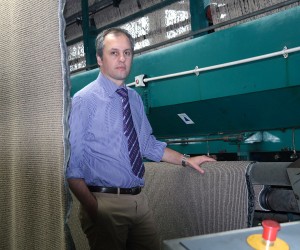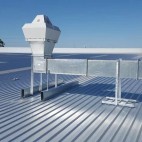Investing in environmental programmes does not raise business costs, it reduces them.
This is the view of Dr Mehran Zarrebini, head of British-based PFE International, whose South African holdings include Van Dyck Carpets and the Mathe Group tyre recycling enterprise.
“I see environmental initiatives as an investment opportunity rather than a threat,” Zarrebini said.
“There will always be a trade-off between investing in growth and investing in sustainability. Pursuing growth may seem like the more glamorous business option but, in my experience, making provision for green projects reaps substantial rewards in the longer term.”
Cleaner manufacturing processes, sourcing environment-friendly and recycled raw materials, recycling for profit, and affiliation to international quality and environmental standards all play a role in Zarrebini’s sustainable business strategy.
Zarrebini said that cleaner, greener manufacturing often involved the purchase of costly new equipment and machinery but that this was almost always accompanied by greater efficiency and productivity as well as a better product, leading to greater demand.
The results speak for themselves. Van Dyck Carpets is growing its market share year on year and the Mathe Group is set to more than quadruple the number of tyres it recycles within five years.
Capital expenditure of R80 million at Van Dyck Carpets over the last few years – including the installation of the largest state-of-the-art fibre extrusion line in the country– has taken place alongside an accomplishment of which Zarrebini is justifiably proud. The company was awarded Carbon Trust Standard certification in May this year – the only South African manufacturer to have achieved this international mark of excellence for reducing carbon emissions.
“The Carbon Trust Standard accreditation provides independent assurance from a globally respected organisation that Van Dyck Carpets is successfully measuring, managing and reducing carbon emissions every year,” Zarrebini said.
“Our commitment to energy efficiency is adding momentum to the ongoing national drive to address South Africa’s energy challenge and help diminish the harmful effects of climate change.”
Elaborating on his proactive sustainable development stance, Zarrebini said, ‘When the government tables the Carbon Tax Bill next year and introduces a carbon tax, organisations will not only have to comply with regulations as regards their own greenhouse gas emissions but it is likely that they will have to account for the performance of their suppliers in this regard, in much the same way as complying with BEE statutes. It will become unaffordable and unwise business practice not to embrace the intent of the Act.”
Van Dyck Carpets plans to implement the ISO 150001 energy management system later this year, usually undertaken only by big global corporations, in addition to its current ISO 9001 quality and ISO 14001 environmental management accreditations.
The benefit of operating a successful rubber tyre recycling business speaks for itself, Zarrebini said. “South Africa adds 11 million used car or truck tyres to the mounting pile of waste tyres dumped in landfills and open areas each year, causing a health and environmental hazard.”
The Mathe Group, an economic empowerment joint venture between PFE International and entrepreneur, Vusumuzi Mathe, is set to boost rubber tyre recycling to a new level in KwaZulu-Natal when it completes a new, multi-million rand rubber crumb manufacturing plant in Hammarsdale later this year.
Zarrebini’s passion for sound environmental stewardship extends to science and research. An example of this is a research study that Van Dyck Carpets is conducting into the use of raw materials – such as yarns and fibres from organically grown crops - that will reduce reliance on oil-derived products such as nylon and polypropylene.
“Our focus is constantly on innovation, resource efficiency and sustainability,” he said.










